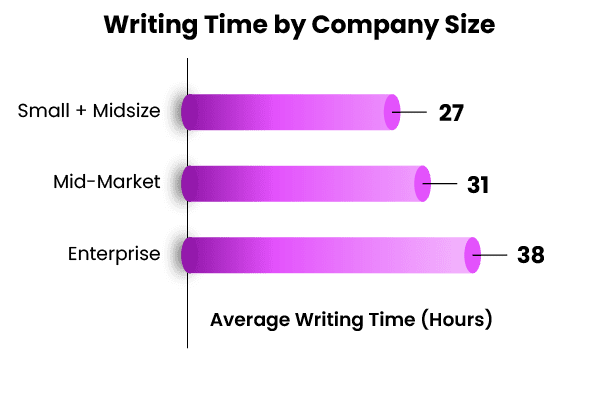2023 RFP Trends & Benchmarks
Chapter 3: The Elusive Balance Of Writing Quality & Speed
Writing time is up overall, but may have diminishing returns. Some struggle to strike the balance between excellence vs. efficient.
This year saw a leap in the number of average hours that teams spend writing. At first blush, our new writing average—32 hours—seems like a significant jump over last year’s 24 hours.

But the average conceals an interesting variance. The difference? That writing time varies greatly between APMP members and non-members:
- APMP members spend an average of 39 hours per response
- Non-APMP members spend an average of 25 hours per response
If we exclude APMP members from the overall average, the average of 25 hours still reflects the small, but consistent rise we’ve seen over the last few years.
More Time Writing Correlates With Higher Win Rates—But There Can Be Diminishing Returns
In past years, more time spent writing has correlated with higher win rates, and that held true this year—to a point. Looking at the data, top performers (those who win more than half their bids) do spend more time writing on average.
However, they don’t diverge from the average in terms of hours spent until the 41+ hour mark (and the differences appear to be fairly minor in terms of % of win rate gained).
|
Hours spent writing a single bid |
| Less than 5 hours |
| 6-10 hours |
| 11-20 hours |
| 21-30 hours |
| 31-40 hours |
| 41-50 hours |
| 51-60 hours |
| 61-70 hours |
| 70+ hours |
| Unsure |
|
% of Average Teams |
| 7% |
| 14% |
| 17% |
| 16% |
| 13% |
| 7% |
| 5% |
| 2% |
| 14% |
| 7% |
|
% of Top Performers |
| 7% |
| 13% |
| 16% |
| 14% |
| 12% |
| 8% |
| 5% |
| 3% |
| 16% |
| 5% |
Although increased writing does seem to correlate with higher win rates, it should be carefully considered against the number of hours that a team is putting into the bid (and whether that contract will be worth the return on investment).
Key Insight: The Average Team Spends 5,184 Hours Writing RFPs Annually
If a bid requires 32 hours of time and there’s 162 RFPs to respond to per year, that means the average team spends 5,184 hours writing responses to RFPs. Considering there’s only 2080 working hours (260 working days, with 8 hours each) in a year—you’d need a team (not single person) to meet these average numbers—or you’re at a serious risk for burnout.
Proposal Teams Spend 7 Hours More Writing Than Sales Groups
Proposal teams spend an average of 34 hours writing each bid, in comparison to their sales counterparts who spend an average of 27 hours responding.

Interestingly, of all groups, those who selected “Other” as their role report spending the most amount of time writing bids (41 hours total, 9 more than the average). It’s likely because this group doesn’t have as much experience writing bids, which leads them to spend more time on the process, without the efficiencies that their peers in proposals or sales have learned.
Why Prioritizing Speed Can Backfire
Three-quarters of sales respondents (74%) submit in 10 business days or less, but have the lowest win rate of any role.
74
%
of sales respondents submit in 10 business days or less, but have the lowest win rate of any role.
Like we’ve already discussed, how you spend the time is what matters most. Efficiency is only valuable if you’re strategically reducing low-value tasks so you can exert more energy on high-value ones. In this case, salespeople are likely rushing, leading to lower quality responses. So don’t let your need for speed cause you to compromise on quality of your responses, or skipping opportunities for customized proposals.
Curious to learn about more writing trends? Download the full report: RFP Trends & Benchmarks.
Writing Time Correlates With Growth of Company
Unsurprisingly, enterprises continue to spend more time writing than small businesses. A smart rule of thumb: the larger the company, the more time spent writing per RFP.

Larger companies also tend to have the highest win rates: Enterprise and Mid-Market sized companies have higher win rates (46% and 45%, respectively), while Small & Midsize win 42% of the time. This supports the correlation between writing time and winning. Though, there are many factors at play, including the fact that Enterprises are also more likely to have more people involved in each RFP (11 people, versus ten for Mid-Market and eight for Small & Midsize).
Chapter Summary: Companies Are Spending More Time Writing, But It Doesn’t Always Translate To More Wins
This year saw a continuation of the steady upwards trend of spending more time writing RFPs—and subsequently spending more time per question. Data indicates that many top performing groups may be spending more time on response writing, but there’s also a group of people responding to RFPs (those who selected ‘Other’ roles) that write more with diminishing returns.
The takeaway? That it’s not about spending more time overall, it’s about spending quality time. Meaning: have the right people, with the support, tools and resources working on your bids.
Up next: More teams are being led by a dedicated proposal manager. But that doesn’t seem to make wrangling SMEs any easier.
Download The Full Report
Get more best practices and trends to guide your team in 2023.